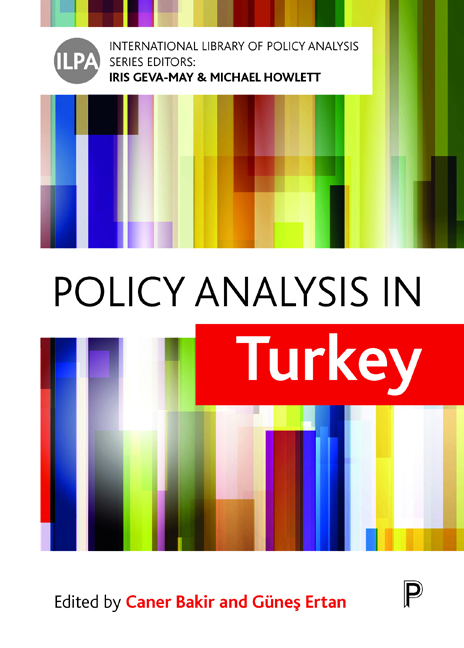Book contents
- Frontmatter
- Contents
- List of tables and figures
- Notes on contributors
- Editors’ introduction to the series
- one Pushing the pendulum from politics to policy: the state of policy analysis in Turkey
- Part One Historical roots, styles and methods of policy analysis in Turkey
- Part Two Policy analysis by governments
- Part Three Experts, international actors and public opinion
- Part Four Parties and civil society-based policy analysis
- Part Five Academic, bureaucratic and advocacy-based policy analysis
- Index
sixteen - Public policy education in Turkey
Published online by Cambridge University Press: 19 April 2022
- Frontmatter
- Contents
- List of tables and figures
- Notes on contributors
- Editors’ introduction to the series
- one Pushing the pendulum from politics to policy: the state of policy analysis in Turkey
- Part One Historical roots, styles and methods of policy analysis in Turkey
- Part Two Policy analysis by governments
- Part Three Experts, international actors and public opinion
- Part Four Parties and civil society-based policy analysis
- Part Five Academic, bureaucratic and advocacy-based policy analysis
- Index
Summary
Introduction
Complementary to public policy research, the teaching of the subject in its modern sense began in the US in the 1960s (Allison, 2006, p 64; Mead, 2013, p 389; Vesely and Zelinkova, 2015, p 51). Public policy research and teaching became transnational by gradually diffusing into other countries with the help of international organisations and think tanks (McGann, 2007, p 67) and other agents of change and transfer. Sanabria-Pulido et al (2016), in their study, emphasise the isomorphism of public affairs education and public policy implementation in the world. They trace the roots of the transfer process, and point at the relationship between the countries with developed and developing economies. Their study shows that the changes in public affairs education in developed countries trigger dissemination in Latin America countries, as in many developing countries (Sanabria-Pulido et al, 2016, p 2).
Turkey is also one of many examples of the transnationalisation and global diffusion of public policy. Although the first academic journal articles and books date back to the 1970s and 1980s (Olgun, 2015), the main increase in public policy teaching, observable in the increasing numbers of public policy courses, teaching materials and academic activities, had begun in the 1990s. Although there were no public policy courses in the undergraduate curriculum recommended for public administration departments by the Turkish Higher Education Agency in 2000 (Şaylan and Sezen, 2000, pp 75-6), public policy education gained further momentum during the 2000s (Orhan, 2007, p 302; Yıldız et al, 2011).
Although the topic of public policy studies is multi-disciplinary by nature, and many specific public policy courses are likely to be taught in various social sciences disciplines, since there is no systematic analysis of such classes in the literature, this chapter focuses on public policy education based only on data collected about public policy courses taught in political science and public administration departments.
Within this framework, this chapter examines the development and current state of public policy education in Turkey, based on the teaching of the subject mostly in political science and public administration departments.
- Type
- Chapter
- Information
- Policy Analysis in Turkey , pp. 271 - 288Publisher: Bristol University PressPrint publication year: 2018

